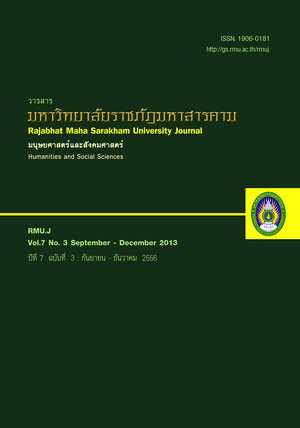การพัฒนารูปแบบการบริหารจัดการเพื่อจัดการเรียนรู้ตามหลักปรัชญาของเศรษฐกิจพอเพียง ในโรงเรียน สังกัดสำนักงานเขตพื้นที่การศึกษามหาสารคาม เขต 3
Main Article Content
บทคัดย่อ
บทคัดย่อ
การวิจัยครั้งนี้ มีวัตถุประสงค์ ประการแรก เพื่อสร้างและพัฒนารูปแบบการบริหารจัดการเพื่อจัดการเรียนรู้ตามหลักปรัชญา ของเศรษฐกิจพอเพียงในโรงเรียน และ ประการที่สอง ประเมินผลการใช้รูปแบบการบริหารจัดการเพื่อจัดการเรียนรู้ตามหลักปรัชญา ของเศรษฐกิจพอเพียงในโรงเรียน โดยใช้กระบวนการวิจัยเชิงปฏิบัติการ เลือกกลุ่มเป้าหมายแบบเจาะจง ประกอบด้วยผู้บริหารโรงเรียน จำนวน 7 คน ครูชั้นประถมศึกษาปีที่ 6 และครูชั้นมัธยมศึกษาปีที่ 3 จำนวน 18 คน และและกรรมการสถานศึกษาขั้นพื้นฐาน จำนวน 24 คน รวมจำนวน 49 คน จากโรงเรียนศรีโกสุมวิทยามิตรภาพที่ 209 และโรงเรียนเขวาไร่ศึกษา เครื่องมือที่ใช้เก็บรวบรวมข้อมูล ได้แก่ แบบประเมินผลการใช้รูปแบบการบริหารจัดการเพื่อจัดการเรียนรู้ตามหลักปรัชญาของเศรษฐกิจพอเพียง ในโรงเรียน มีค่าอำนาจจำแนก รายข้อ (rxy) ตั้งแต่ 0.30 ถึง 0.70 มีค่าความเชื่อมั่นทั้งฉบับ เท่ากับ 0.93 แบบประเมิน ความพึงพอใจต่อการบริหารจัดการเพื่อจัดการ เรียนรู้ตามหลักปรัชญาของเศรษฐกิจพอเพียงในโรงเรียน มีค่ามีค่าอำนาจจำแนกรายข้อ (rxy) ตั้งแต่ 0.40 ถึง 0.82 มีค่าความเชื่อมั่น ทั้งฉบับ เท่ากับ 0.90 ส่วนเบี่ยงเบนมาตรฐาน แบบสังเกต แบบสัมภาษณ์ และแบบบันทึกการประชุมการสนทนากลุ่ม วิเคราะห์ข้อมูล ใช้การวิเคราะห์เนื้อหา ค่าเฉลี่ย และค่าส่วนเบี่ยงเบนมาตรฐาน ผลการวิจัยพบว่า
1. รูปแบบการบริหารจัดการเพื่อจัดการเรียนรู้ตามหลักปรัชญาของเศรษฐกิจพอเพียงในโรงเรียน สังกัดสำนักงานเขตพื้นที่ การศึกษามหาสารคาม เขต 3 มีองค์ประกอบ 4 ด้าน ได้แก่ การเตรียมความพร้อมบุคลากร การจัดทำหลักสูตรตามหลักปรัชญาของ เศรษฐกิจพอเพียงการวางแผนและการนำหลักสูตรตามหลักปรัชญาของเศรษฐกิจพอเพียงไปใช้ และการนิเทศ กำกับ ติดตาม ประเมิน ผล สรุปผลการดำเนินงาน และการปรับปรุงพัฒนา
2. การใช้รูปแบบการบริหารจัดการเพื่อจัดการเรียนรู้ตามหลักปรัชญาของเศรษฐกิจพอเพียงในโรงเรียน มีความเหมาะสมอ ยู่ในระดับมาก (ค่าเฉลี่ย = 4.02) และมีความพึงพอใจอยู่ในระดับมาก (ค่าเฉลี่ย = 4.15)
คำสำคัญ : การบริหารจัดการเพื่อจัดการเรียนรู้ตามหลักปรัชญาของเศรษฐกิจพอเพียง
ABSTRACT
The aims of the research were: firstly, to construct and develop the learning management model based upon the philosophy of sufficiency economy in schools; and secondly, to evaluate the implementation of learning management model by using action research. The samples, selected through purposive sampling, consisted of 7 school administrators, 18 teachers from grade six students and grade nine students, and 24 basic education committee totally 49 persons from Sri Kosum Wittaya Mitraphap 209 School and Khwao Ria Suksa Schools. The instruments used for gathering data were an evaluation form of system development implementation of learning management model which was discrimination between 0.30-0.70 and 0.93 of reliability, an evaluation form of satisfaction which was 0.40-0.82 of discrimination and 0.90 of reliability, an observation form and a focus group discussion report. Data were analyzed by content analysis. The statistics used for analyzing data were mean and standard deviation.
The results of the research were as follows:
1. The model of learning management based upon the philosophy of sufficiency economy in schools under Office of Maha Sarakham Primary Education Service Area 3 consisted of 4 aspects: readiness preparation for personnel, conducting curriculum based on the philosophy of sufficiency economy, planning and implementing the curriculum, and also supervising, directing, following-up, evaluating, concluding the operation and improving and developing.
2. The evaluation of the implementation of the model of learning management based upon the philosophy of sufficiency economy in schools was rated at a high level. The participants’ satisfaction of the model was rated at a high level.
Keywords : the Learning Management Based Upon the Philosophy of Sufficiency Economy
Article Details
1. บทความที่ลงตีพิมพ์ทุกเรื่องได้รับการตรวจทางวิชาการโดยผู้ประเมินอิสระ ผู้ทรงคุณวุฒิ (Peer Review) สาขาที่เกี่ยวข้อง อย่างน้อย 3 ท่าน ในรูปแบบ Double blind review
2. ข้อคิดเห็นใด ๆ ของบทความที่ลงตีพิมพ์ในวารสารมหาวิทยาลัยราชภัฏมหาสารคาม นี้เป็นของผู้เขียน คณะผู้จัดทำวารสารไม่จำเป็นต้องเห็นด้วย
3. กองบรรณาธิการวารสารมหาวิทยาลัยราชภัฏมหาสารคาม ไม่สงวนสิทธิ์การคัดลอกแต่ให้อ้างอิงแสดงที่มา


